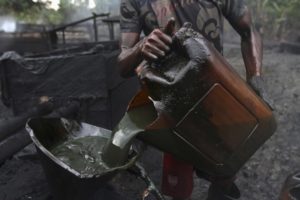
The oil subsidy scammers, who benefited immensely from fake importation of petroleum products, are nurturing vandalism, militancy, crude oil theft and the unwarranted disruptions in the sector, to the level being witnessed, especially in the Niger Delta.
The disclosure was made Wednesday in Port Harcourt, the Rivers State capital, by the Convener of the Second Edition of the Save Nigeria Oil and Gas Industry (SNOAGI) Roundtable, Dr. Brown Ogbeifun.
The roundtable was organised by the African Initiative for Transparency, Accountability and Responsible Leadership (AFRITAL).
Project SNOAGI was launched last year, as a veritable platform for bringing stakeholders together to interact, brainstorm and make prescriptions on how to improve the efficiency of the oil and gas operations, thereby assisting government in bringing sanity to the sector.
Ogbeifun said: “Most of the motherless US Dollars, British Pounds, Euro and Naira found in wardrobes, farms and soak-away pits are definitely primary or secondary products of mismanaged oil funds, which might explain why the oil industry has witnessed gross underdevelopment.
“The revelations emanating from the Malabu oil deal, the brazen cash withdrawals from oil money accounts to pursue non-value addition to the good of our hydrocarbon development are indeed very sad.
“There is no doubt that there has been lack of investors’ confidence in the oil industry, as policies and laws that would have protected their investments are not seriously addressed.
“The issues of over regulation through multiple regulatory agencies, multiple taxation, global and local oil politics have made it an intractable possibility for Nigeria to reach it’s optimum productivity.”
The convener also stated that Nigeria was ripe enough to be self-sufficient in producing all the necessary derivatives from crude oil.
Ogbeifun noted that compounding the parlous state of the oil and gas sector came the sabotaging of the pipelines by the militants, which he insisted almost crippled operations in the sector.
He said: “Paradoxically, we export our crude oil and create refining capacities for other economies, at the detriment of the Nigerian state. Why must we continue to export our mineral resources in exchange for finished products in the oil and gas industry?
“Our leaders have consistently displayed lack of political will to drive the transformation imperatives to a logical conclusion. That is why we are still talking of the Petroleum Industry Bill (PIB), 17 years after it started its journey.
“No country treats its critical reforms the way we do. Not passing the PIB has led to losses in trillions of naira, loss of investment opportunities, inability to realise our optimum capacity utilisation and the inability to end gas flaring, which was to have ended in 2008.
“The PIB might not be a perfect document, just as it is all over the world. All we need is an enduring dialogue process and the will of steel by government to drive the process to its logical conclusion. No matter the drawbacks, the PIB contains many sections that would have greatly enhanced the hydrocarbon potential of Nigeria.”
The convener also stated that mediation was very effective in the resolution of knotty conflicts, while pleading that the ongoing dialogue process between top officials of the Federal Government and Niger Delta militants/leaders should be sustained.
He noted that while government was seeking solutions to all the challenges in the Niger Delta, all parties should sheathe their swords, show good faith and respect for one another, declaring that no meaningful development would take place in an atmosphere of chaos and anarchy.
Ogbeifun added that the pronouncements of the Federal Government’s top officials on the setting up of modular refineries in the Niger Delta and the open confession that the crude oil and gas-rich region deserved a better deal, showed that there were still honourable men in the corridors of power in Nigeria.
